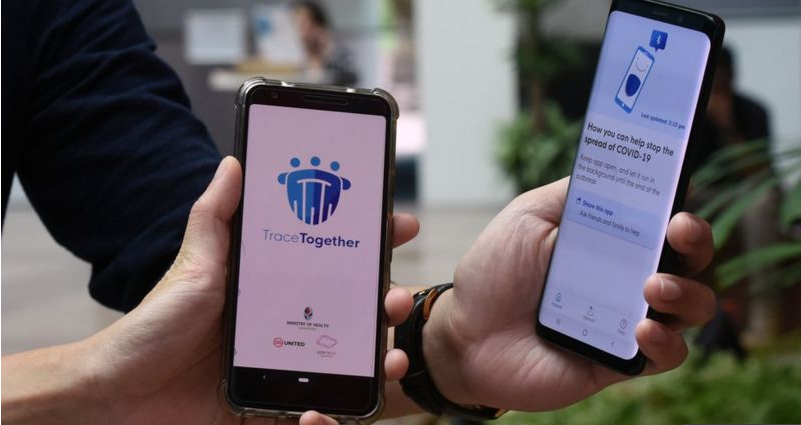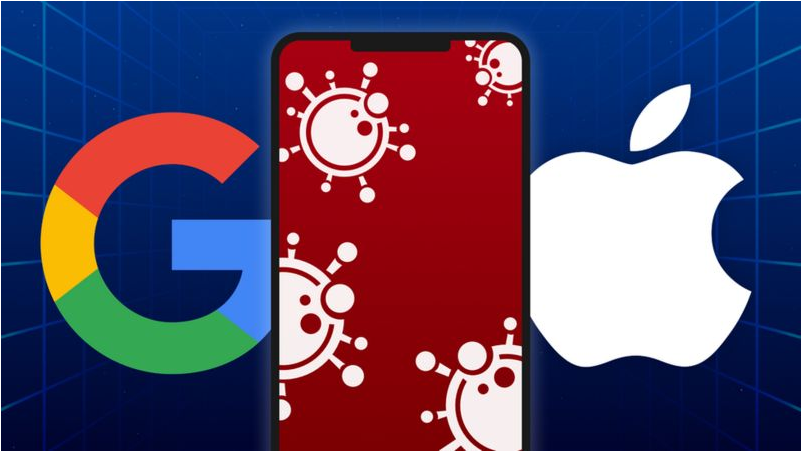Leading the fight against coronavirus, the State…or Apple and Google?

Figure one: Getty Images. TraceTogether Phone Image. 17 Apr. 2020, https://www.bbc.com/news/technology-52325352.
In the month of March, as more than half the world’s population headed into lockdown, internet privacy campaigner Maciej Cegłowski released his relatively worryingly titled article “We Need A Massive Surveillance Program” (Cegłowski). Cegłowski joined a chorus of academics, tech experts and ordinary citizens questioning the implications of new coronavirus tracing apps beginning to roll out at the time. However, these debates about privacy and apps were anything but new. As Cegłowski essentially points out in his article, “we need a massive surveillance system” … it’s a good thing we already had one (Cegłowski).
What are contact tracing apps?
Different countries have taken different approaches to contact tracing, but many have some form of contact tracing smartphone app available. The apps use what (in smartphone technology time) are old technologies. Most are a combination of an interface and use Bluetooth, Wi-Fi connections, QR codes and location data in order to track the user’s location and contacts. As well as varying technologically, the apps also have differing levels of privacy. In countries like China and Qatar coronavirus tracing apps are mandatory (‘Qatar Has Made Its Coronavirus Contact Tracing App Mandatory’) (Zhong). Some countries have made their technologies less invasive, using encryption so that users’ information is stored in the user’s smartphone, not in government systems (Criddle and Kelion). However, what makes contact tracing apps new, in the West in particular, is that they openly use this technology to trace the user’s location and contacts.
The Privacy debate
Contact tracing apps have awakened a new wave of privacy concerns as many point out that a lot of these applications record important personal data. However, the vast majority of smartphones collect this information anyway (Vogelstein and Knight). In most Western societies, rights to privacy online have been debated for years. It has been noted in studies across various disciplines that more of a user’s information may be taken by smartphone apps when downloaded, in use, or on standby than the user is notified or aware of (Tsai et al.). There are also many cases in which privacy concerns have been raised in normal, widely used health apps, let alone those rapidly developed for a pandemic (McCarthy).
Trading privacy in the name of the public good
The overwhelming consensus is that there is a strong imperative for using citizen’s location and contact data for the good of public health, but health officials and academics worldwide argue that there is no need to compromise citizen’s privacy anywhere in order to do this (Cho et al). The recently formed Covid-19 Mobility Data Network in the United States formed based on promoting the principle that collecting the necessary information to slow the pandemic can be done anonymously (Waddell). It is interesting that coronavirus tracing apps are raising privacy concerns from citizens compared to other standard health apps, which collect similar data without stating this overtly (McCarthy). To look at the privacy issues being raised here, this blog post will examine the coronavirus contact tracing app produced in the early stages of the pandemic by major app providers Apple and Google.

Figure two: BBC. Apple, Google, Phone Webpage Image. 20 May 2020, https://www.bbc.com/news/technology-52740131.
Apple and Google’s contact tracing app
Apple and Google joined to make a coronavirus tracing app which would harness the extensive digital infrastructure developed through their normal services to effectively allow for extensive coronavirus contact tracing (Mlot). Their infrastructure is so huge, that they have announced plans to release this technology to around two billion users, a larger population than any single country (Mlot). Soon after announcing the app, Apple and Google responded to criticism about the app’s privacy by excluding GPS technology from their app (Mlot). Martinez-Martin et al note that Google and Apple also decided after facing criticism to make the information from the technology only accessible to health officials, and to make provisions for the technology to be completely thrown out when the pandemic is over (Martinez‐Martin et al. 45).
What was interesting about this app, and the changes made, was that it showed that privacy does not need to be compromised in order to make an effective app for communication. However, even with these changes shortly after it was announced, policy makers in the US decided not to pick up the technology (Vogelstein and Knight). Other countries including the UK also refused the technology (Smith). As Vogelstein and Knight point out, “it’s no longer universally good for a politician’s popularity to be too closely associated with the titans of Silicon Valley” (Vogelstein and Knight). As Western governments rejected the app even with these changes, it is also worth looking at the privacy mechanisms of the contact tracing apps developed by these governments for the same purpose.
Contact tracing apps from the state
Western states may have turned down Apple and Google’s tracing app in favour of their own due to privacy concerns, or as Vogelstein and Knight point out to at least make sure they appear to be doing this (Vogelstein and Knight). However, some health experts warn against allowing the state to have the ability to collect this information too (Raskar et al.). The biggest debate in Western government’s development of their own apps, is to make apps either “centralised” where the Government holds the data, or “decentralised” where the user does (Criddle and Kelion). Both are proving popular options. As Lapolla and Lee point out, there is also a risk that government-developed technologies could put citizen’s data at risk, if they are crudely built in a hurry (Lapolla and Lee).
Perhaps the risk here is not so much that the technology is already being used by corporations to track us, or that they will expand this surveillance in the name of the public good. But it might instead be that Western governments will begin to do this after the pandemic ends too, as Raskar et al, in their examination of the risks and benefits of contact tracing apps suggest will be easy if focus is taken away by the growing pandemic.
Works cited
BBC. Apple, Google, Phone Webpage Image. 20 May 2020, https://www.bbc.com/news/technology-52740131.
Ceglowski, Maciej. We Need A Massive Surveillance Program (Idle Words). 23 Mar. 2020, https://idlewords.com/2020/03/we_need_a_massive_surveillance_program.htm.
Cho, Hyunghoon, et al. ‘Contact Tracing Mobile Apps for COVID-19: Privacy Considerations and Related Trade-Offs’. ArXiv:2003.11511 [Cs], Mar. 2020. arXiv.org, http://arxiv.org/abs/2003.11511.
Criddle, Christina, and Leo Kelion. ‘Coronavirus Contact-Tracing: World Split between Two Types of App’. BBC News, May 2020, https://www.bbc.com/news/technology-52355028.
Getty Images. TraceTogether Phone Image. 17 Apr. 2020, https://www.bbc.com/news/technology-52325352.
Lapolla, Pierfrancesco, and Regent Lee. ‘Privacy versus Safety in Contact-Tracing Apps Forcoronavirus Disease 2019’. Sage, vol. 6:1-2, July 2020, doi:https://doi.org/10.1177/2055207620941673.
Martinez‐Martin, Nicole, et al. ‘Digital Contact Tracing, Privacy, and Public Health’. The Hastings Center Report, vol. 50, no. 3, Wiley Subscription Services, Inc, John Wiley and Sons Inc, 2020, pp. 43–46. lib.uva.nl, doi:10.1002/hast.1131.
McCarthy, Michael. ‘Experts Warn on Data Security in Health and Fitness Apps – ProQuest’. British Medical Journal (Online), vol. 347, Sept. 2013, https://search.proquest.com/openview/4b1d76edb55b01a17102dc8a53039eb2/1?pq-origsite=gscholar&cbl=2043523.
Mlot, Stephanie. ‘Apple, Google Ban GPS Data Collection for COVID-19 Contact-Tracing Apps’. Mashable Australia, May 2020, https://mashable.com/article/apple-google-gps-contact-tracing-apps/.
‘Qatar Has Made Its Coronavirus Contact Tracing App Mandatory’. BuzzFeed News, https://www.buzzfeednews.com/article/meghara/qatar-coronavirus-tracking-app-mandatory. Accessed 27 Sept. 2020.
Raskar, Ramesh, et al. ‘Apps Gone Rogue: Maintaining Personal Privacy in an Epidemic’. ArXiv:2003.08567 [Cs], Mar. 2020. arXiv.org, http://arxiv.org/abs/2003.08567.
Smith, Adam. ‘UK Health Service Rejects Apple-Google Coronavirus Contact Tracing System’. PC Mag Australia, Apr. 2020.
Tsai, Janice Y., et al. ‘The Effect of Online Privacy Information on Purchasing Behavior: An Experimental Study’. Information Systems Research, vol. 22, no. 2, INFORMS, Feb. 2010, pp. 254–68. pubsonline.informs.org (Atypon), doi:10.1287/isre.1090.0260.
Vogelstein, Fred, and Will Knight. ‘Health Officials Say “No Thanks” to Contact-Tracing Tech’. Wired. www.wired.com, https://www.wired.com/story/health-officials-no-thanks-contact-tracing-tech/. Accessed 27 Sept. 2020.
Waddell, Kaveh. ‘Coronavirus Researchers: “We Don’t Need to Spy on Everyone to Track the Pandemic”’. Consumer Reports, https://www.consumerreports.org/health-privacy/coronavirus-researchers-we-dont-need-to-spy-on-everyone-to-track-the-pandemic/. Accessed 27 Sept. 2020.
Zhong, Raymond. ‘China’s Virus Apps May Outlast the Outbreak, Stirring Privacy Fears’. The New York Times, May 2020, https://www.nytimes.com/2020/05/26/technology/china-coronavirus-surveillance.html.